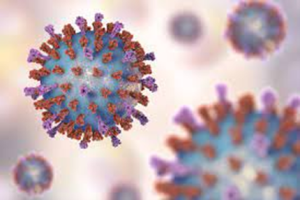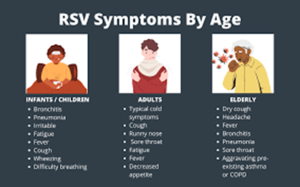Please click the frequently asked questions below for further information and IPC precautions required:
-
What is RSV?
Respiratory syncytial virus (RSV) causes infections of the lungs and respiratory tract. It’s so common that most children have been infected with the virus by age 2. Respiratory syncytial (sin-SISH-ul) virus can also infect adults.
In adults and older, healthy children, RSV symptoms are mild and typically mimic the common cold. Self-care measures are usually all that’s needed to relieve any discomfort.
RSV can cause severe infection in some people, including babies 12 months and younger (infants), especially premature infants, older adults, people with heart and lung disease, or anyone with a weak immune system (immunocompromised).

-
How does it spread?
RSV can spread when:
- An infected person coughs or sneezes
- You get virus droplets from a cough or sneeze in your eyes, nose, or mouth
- You have direct contact with the virus, like kissing the face of a child with RSV
- You touch a surface that has the virus on it, like a doorknob, and then touch your face before washing your hands
People infected with RSV are usually contagious for 3 to 8 days and may become contagious a day or two before they start showing signs of illness. However, some infants, and people with weakened immune systems, can continue to spread the virus even after they stop showing symptoms, for as long as 4 weeks.
Infections in healthy children and adults are generally less severe than among infants and older adults with certain medical conditions. People at highest risk for severe disease include:
- Premature infants
- Young children with congenital (from birth) heart or chronic lung disease
- Young children with compromised (weakened) immune systems due to a medical condition or medical treatment
- Children with neuromuscular disorders
- Adults with compromised immune systems
- Older adults, especially those with underlying heart or lung disease
-
What are the symptoms of RSV?
People infected with RSV usually show symptoms within 4 to 6 days after getting infected.
Symptoms of RSV infection usually include:
- Runny nose
- Decrease in appetite
- Coughing
- Sneezing
- Fever
- Wheezing
These symptoms usually appear in stages and not all at once. In very young infants with RSV, the only symptoms may be irritability, decreased activity, and breathing difficulties.

-
Why is this important?
If NIAS staff are aware that the patient has a suspected or confirmed case this should be communicated to the Control Room (Emergency or Non-emergency as appropriate) and the staff in the receiving unit when transferring the patient to ensure effective patient care and management.
-
IPC Precautions
- Droplet Precautions should be used
- Hand Hygiene should be completed as per the 5 moments in line with usual practice.
- Eye protection should be risk assessed for any concern regarding a splash risk.
- A Fluid Resistant Surgical Mask should be worn.
- Gloves and Aprons should be worn.
- The patient should be transported via ambulance with no other patients present
- Laundry should be treated as contaminated, placed into an alginate bag and placed into a red laundry bag.
-
What cleaning is required?
All equipment and the ambulance should have an in-between patient clean paying particular attention to touch points.
-
Do staff need prophylaxis or follow up?
If appropriate PPE is worn there is no follow up required for staff.
If staff have had a breach in PPE they should remain vigilant for any signs or symptoms. There is no prophylaxis required and staff do not need to remain off work.




